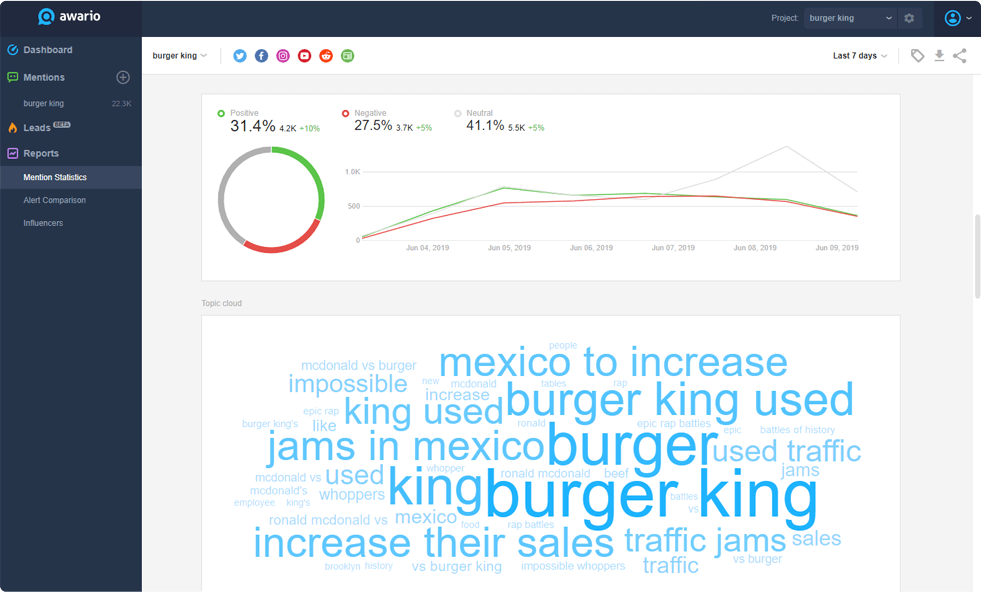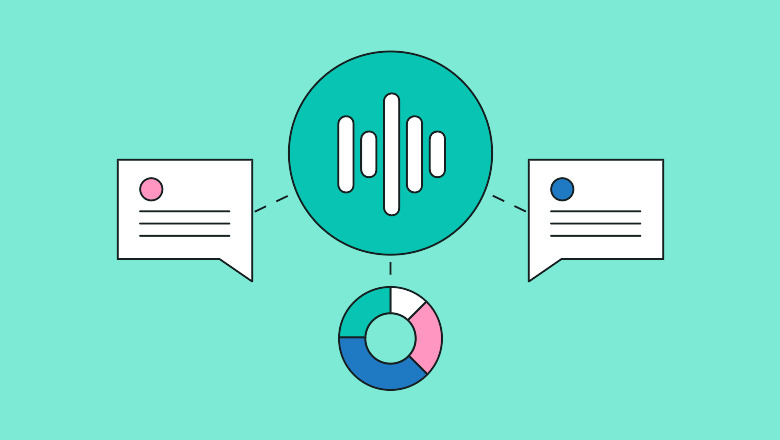In today’s digital era, social media has become an essential platform for businesses to connect with their target audience, build brand awareness, and gain valuable insights. Social media listening and sentiment analysis tools play a crucial role in understanding customer sentiments, identifying trends, and managing brand reputation. This article explores the concept of social media listening and sentiment tools for businesses.
Social Media Listening And Sentiment Tools

Sentiment analysis is a crucial aspect of social media listening, as it helps businesses gauge the overall sentiment associated with brand mentions and customer feedback. By understanding sentiment, businesses can identify areas of improvement, address concerns, and enhance customer satisfaction.
How Sentiment Analysis Tools Work
Sentiment analysis tools employ natural language processing techniques and machine learning algorithms to analyze the tone, context, and emotion expressed in social media conversations. These tools classify text as positive, negative, or neutral, providing an overview of the sentiment associated with a particular brand, product, or topic.
Benefits of Sentiment Analysis Tools
Using sentiment analysis tools in social media listening offers several benefits, including:
- Quick Insights: Sentiment analysis tools provide quick and automated insights into customer sentiment, saving time and effort in manually analyzing large volumes of data.
- Brand Reputation Management: By monitoring sentiment, businesses can proactively manage their brand reputation, identify potential issues, and respond promptly.
- Product Improvement: Sentiment analysis helps businesses identify specific areas for improvement in their products or services based on customer feedback.
- Competitive Analysis: Analyzing sentiment around competitors’ brands and products allows businesses to benchmark their performance and identify areas for differentiation.
Importance of Social Media Listening
Social media listening is vital for businesses as it provides real-time feedback, helps in understanding customer needs and expectations, and guides strategic decision-making. By actively listening to social media conversations, businesses can identify emerging trends, monitor brand reputation, and discover opportunities for innovation.
Benefits of Social Listening
- Customer Insights: Social media listening allows businesses to gather valuable customer insights, such as preferences, opinions, and pain points. This information helps in developing targeted marketing campaigns and improving products or services.
- Competitor Analysis: By monitoring social media conversations about competitors, businesses can gain a competitive edge by identifying gaps, understanding market trends, and benchmarking their performance.
- Brand Reputation Management: Social media listening enables proactive brand reputation management. It helps in identifying and addressing negative sentiment, managing crises, and nurturing positive brand associations.
- Identifying Influencers: Social media listening tools can identify influential individuals who can amplify brand messages and reach a wider audience. Collaborating with influencers can enhance brand visibility and credibility.
- Crisis Detection and Response: Real-time monitoring of social media conversations helps in detecting potential crises and enables businesses to respond swiftly, minimizing reputational damage.
How Does Social Media Listening Work?

Social media listening involves the use of specialized tools and technologies to gather, analyze, and interpret social media data. Also, these tools employ algorithms and natural language processing techniques to extract relevant insights from vast amounts of unstructured data. The process typically involves data collection, analysis, and reporting.
Types of Social Media Listening Tools
There are various types of social media listening tools available, including:
- Keyword-based Tools: These tools monitor social media platforms for specific keywords or phrases related to the brand or industry, providing insights based on mentions and sentiment.
- Topic/Hashtag Tracking Tools: These tools focus on tracking conversations related to specific topics or hashtags, helping businesses identify trending discussions and participate in relevant conversations.
- Influencer Identification Tools: These tools help businesses identify influential individuals within their industry, enabling targeted influencer marketing campaigns.
- Competitor Analysis Tools: These tools monitor competitor mentions and activities, providing valuable insights for competitive analysis and strategic decision-making.
- Sentiment Analysis Tools: Sentiment analysis tools analyze social media data to determine the sentiment (positive, negative, or neutral) associated with brand mentions, helping businesses gauge overall customer sentiment.
Popular Social Listening Tools
- Aim Technologies: A comprehensive social media listening tool that offers real-time monitoring, sentiment analysis, and customizable dashboards.
- Hootsuite Insights: Hootsuite Insights provides social media monitoring and sentiment analysis features, along with powerful reporting capabilities.
- Sprout Social: Sprout Social offers social media listening and engagement tools, allowing businesses to track conversations, measure sentiment, and manage their online presence.
- Mention: Mention provides real-time monitoring and analysis of social media mentions, enabling businesses to track brand reputation and industry trends.
Features to Consider in Social Media Listening Tools
When selecting social media listening tools, businesses should consider the following features:
- Real-time Monitoring: Tools that provide real-time data collection and monitoring capabilities ensure businesses stay updated on the latest conversations and trends.
- Sentiment Analysis: Advanced sentiment analysis capabilities help in understanding the overall sentiment associated with brand mentions and customer feedback.
- Data Visualization: Effective data visualization features, such as customizable dashboards and reports, make it easier to derive actionable insights and present findings.
- Competitor Analysis: Tools with competitor analysis functionalities enable businesses to gain insights into their competitors’ strategies, strengths, and weaknesses.
- Integration: Seamless integration with other marketing and analytics tools allows businesses to consolidate data and also, streamline their decision-making processes.
Best Practices for Using Social Listening Tools
To maximize the benefits of social media listening tools, businesses should follow these best practices:
- Define Clear Objectives: Determine specific goals and objectives for social media listening, such as understanding customer sentiment, improving product offerings, or identifying market trends.
- Choose Relevant Keywords: Select keywords and phrases that are relevant to the brand and industry to ensure accurate and meaningful data collection.
- Engage with Customers: Actively engage with customers by responding to their feedback, addressing concerns, and participating in relevant discussions.
- Monitor Competitors: Keep a close eye on competitors’ social media activities and leverage insights to enhance marketing strategies and stay ahead in the market.
- Regularly Review and Analyze Data: Continuously review and analyze social media data to identify patterns, trends, and also, emerging opportunities or challenges.
Challenges of Social Media Listening
While social media listening provides valuable insights, there are some challenges to consider:
- Data Overload: The vast amount of social media data can be overwhelming. Businesses must have efficient tools and processes in place to filter, analyze, and derive meaningful insights.
- Language and Context: Understanding the context and sentiment behind social media conversations can be challenging due to slang, sarcasm, and cultural nuances.
- Privacy Concerns: Privacy regulations and ethical considerations must be taken into account when collecting and analyzing social media data.
- Emerging Platforms: New social media platforms and trends constantly emerge, requiring businesses to adapt and also, expand their listening strategies.
Integrating Social Media Listening and Sentiment Analysis
Integrating social media listening with sentiment analysis tools enables businesses to gain a deeper understanding of customer sentiment and its impact on their brand. Also, by combining social media listening insights with sentiment analysis data, businesses can make data-driven decisions, develop effective marketing strategies, and enhance customer experiences.
FAQs
What is social listening?
- Social media listening refers to the process of monitoring and analyzing online conversations and mentions related to a brand.
Why is social listening important for businesses?
- Social media listening helps businesses understand customer needs, monitor brand reputation, and identify trends.
Can social listening help in brand reputation management?
- Yes, social media listening allows businesses to proactively manage their brand reputation also, by monitoring conversations, identifying and addressing negative sentiment, and responding promptly to customer feedback.
How can sentiment analysis tools benefit businesses?
- Sentiment analysis tools automate the process of analyzing customer sentiment, providing quick insights into brand perception, identifying areas for improvement, and enabling proactive brand management.
Is social listening only useful for large companies?
- No, social media listening is valuable for businesses of all sizes.
Conclusion
Social media listening and sentiment analysis tools provide businesses with valuable insights into customer sentiments, brand reputation, and industry trends. Integrating sentiment analysis enhances the depth of understanding and enables businesses to make informed decisions based on accurate sentiment data.
Also, to experience the power of social media listening and sentiment analysis firsthand, request a demo from Aim Technologies. Discover how our advanced tools can help your business unlock valuable insights and drive strategic decision-making. Don’t miss out on the opportunity to gain a competitive edge and strengthen your brand presence in the digital landscape.


